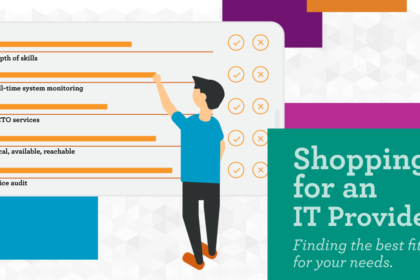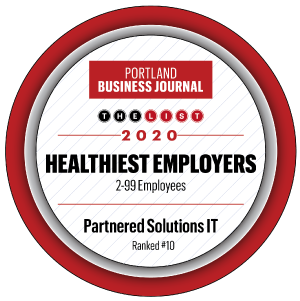
So you’re shopping for an IT company. Perhaps you have come to the realization you need one, or perhaps you’ve become frustrated with the one you’re working with; in any case, this may be unchartered territory. Some things are no-brainers; you want a team with a depth of skillsets, with different specialists in areas like firewall, cloud solutions, compliance, and backups. You also probably want to work with a local outfit, or at least a company where you know you can get on the phone with a human at any hour of the day. But, you don’t want to be tied to a company with total proprietary setups so that your whole system is dismantled when you break the news—that it’s time to break up.
Here at Partnered Solutions, we’ve put together five big questions that you should ask when shopping for an IT company, because we like to consider ourselves experts on what makes a good Managed Service Provider. Let’s dive in. (Would you rather talk to a person? Give us a call!)
1. Do you have your own in-house help desk, or do you outsource it to a third party?
The best service providers staff their help desks onsite. In-house help desk support are better trained on the company’s specific software and tools, and can be more easily held to company standards which translates to better overall customer support experience. You’ll also want to know whether they can send tech support to your location, should you need it; contracting with a company that’s an hour’s drive away or more could be problematic.
2. Do you have Service Level Agreements and if so, what is the average response time?
A Service Level Agreement (SLA) is a commitment from the IT provider on how fast they will respond to your support requests based on severity, and impact to your business operations. Severity is the level of degradation or urgency of a specific issue, whereas impact refers to the number of users impacted by an issue. The higher severity and greater impact of a problem, the faster an IT provider should be knocking on your door. You’re looking for something like this:
| Priority Matrix | High Severity | Medium Severity | Low Severity |
|---|---|---|---|
| High Impact | Priority 1 | Priority 1 | Priority 2 |
| Medium Impact | Priority 1 | Priority 2 | Priority 3 |
| Low Impact | Priority 2 | Priority 3 | Priority 4 |
A quality provider should know how long it takes them to respond to both high and low priority requests. They should guarantee those response times and have a system in place that tracks those response times, and to take it a step further offer you reporting that allows you to see how they are doing at meeting their SLA.
3. What type of network monitoring do you provide?
There are numerous solutions available to IT providers, but the overall goal should be to be proactive IT, catching problems before they cause downtime, and taking decisive corrective action. The following are some types of network monitoring to ask about: Do they simply monitoring online and offline status? Do they monitor drive space on servers, CPU usage, Memory? How about if applications are running? What happens when something being monitored goes offline, or exceeds the thresholds they’ve set? If something in your system goes down over the weekend, you want an IT company that’s waiting for you to unlock the doors before everyone else arrives on Monday morning.
4. Cloud infrastructure: are the cloud services proprietary, or outsourced to a third party?
Almost all IT providers offer some form of cloud services; however, if a provider outsources their cloud services, there are security concerns that must be discussed. Your IT provider may have promised to adhere to specific security compliance standards, but what about the security compliance practices of their vendor? Who is responsibility should a failure occur and how will that play out? Who owns the data? Most IT providers promise to destroy your data when the contract is up, but you’ll want assurance that the third party vendor will actually do so, and have confirmation for when it has happened. You’ll want to ensure your IT provider won’t leave you to sort things out with this third party. Outsourcing of cloud services in itself is not inherently a bad thing, but being left in the dark about the who, what and where is dangerous for your business. Your data is of the utmost importance.
Bonus follow-up question: What compliance frameworks do you support?
If HIPPA, PCI, GDPR, or NIST compliance is important to your business, you need an IT provider with the tools, certifications and experience to ensure your business maintains compliance standards. What sort of testing do they perform? Do they do this work in-house, or do they have a 3rd party vendor – and if so, will they give you the name of the vendor so you can do your due diligence? Since the failure to meet compliance can carry heavy consequences for your business, this question could easily be at the top of the list.
5. How big is your company?
The goal in asking this question is to find a goldilocks IT provider. A large, faceless IT company can lack the ability to understand your business and its unique needs, but a shop of only one or two people will struggle to maintain good response time, as there will always be times when someone else’s issue takes precedence due to severity. So, you want a team that can offer an array of solutions, products, and has a wide knowledge base. You need to be confident they can meet your needs with the staff they currently employ. You need to feel secure in their hiring practices, as their employees will invariably have access to your business data and that of your employees.
Finally, we think it’s important that an IT provider not only help you with the technology you have, they should also help you plan for the future of that technology. If you have time for one more question, find out if they offer a Virtual Chief Technology Officer (vCTO). A good IT provider will lend you the knowledge of their top tech executives to help you strategically plan your investments in hardware, software, and other infrastructure in the coming years.
We understand that heavy decisions are made before shopping around for an IT company even begins. The process ought to include second opinions and end with your feeling that your data is safe and protected, your technology is well-looked after, and the friendly voice on the other end of the help line has your company’s best interests in mind. We at Partnered Solutions IT would be happy to answer these questions from you, or questions about these questions. Give us a shout by filling out the form on the right, or feel free to call us – we answer the phone 24/7 (nudge, nudge).






